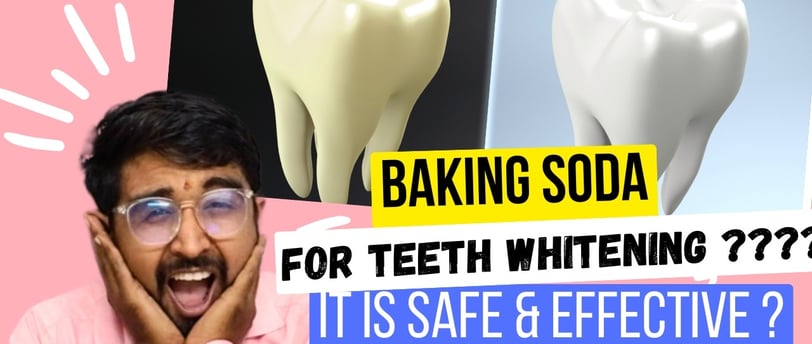Baking Soda for Teeth Whitening: Is It Safe and Effective?
Discover the Truth About Baking Soda for Teeth Whitening! Looking for a natural and affordable way to whiten your teeth? Baking soda is a popular remedy, but is it really safe and effective? In this blog, we reveal the science behind baking soda for teeth whitening, its benefits, risks, and the best ways to use it for a brighter smile! Does baking soda really whiten teeth? How to use it safely without damaging enamel? Best natural oral care routine for long-term results. Get expert insights from Dr. Shubham P. Dhawale at Shubhapushpa Healthcare™ and learn how to achieve a healthy, radiant smile naturally!
Dr. Shubham P. Dhawale (BAMS, MD Ayurveda) Co-founder of Shubhapushpa Healthcare™
3/9/20253 min read


Baking Soda for Teeth Whitening: Is It Safe and Effective?
Baking soda, also known as sodium bicarbonate, has gained immense popularity as a natural teeth-whitening remedy. Its mild abrasiveness and alkaline properties make it a preferred choice in oral care. But is baking soda really effective for teeth whitening? And more importantly, is it safe for long-term use?
In this article, we’ll explore the science behind baking soda for teeth whitening, its benefits, potential risks, and the best ways to use it in your oral hygiene routine.
1. How Does Baking Soda Whiten Teeth?
Baking soda (NaHCO₃) is a mildly abrasive compound that helps remove surface stains from the enamel. When mixed with water, it releases free radicals that break down stain molecules, effectively brightening your teeth.
Types of Teeth Stains:
Extrinsic stains: Caused by food, coffee, tea, smoking, and poor oral hygiene. These stains sit on the surface of the enamel.
Intrinsic stains: Form within the enamel due to aging, excessive fluoride, or medications. Baking soda mainly helps with extrinsic stains.
Baking soda also neutralizes acids in the mouth, which helps prevent enamel erosion and plaque buildup.
2. Benefits of Using Baking Soda for Oral Hygiene
2.1. Natural Teeth Whitening
Baking soda is a gentle and natural alternative to chemical-based whitening treatments. Unlike hydrogen peroxide-based whiteners, it does not cause excessive tooth sensitivity.
2.2. Reduces Plaque and Prevents Cavities
Plaque is a sticky bacterial film that leads to tooth decay and gum disease. The gentle abrasiveness of baking soda helps remove plaque without damaging the enamel.
2.3. Balances pH Levels in the Mouth
A highly acidic environment promotes bacterial growth, leading to tooth decay and bad breath. Baking soda helps neutralize acidity, creating a healthier oral environment.
2.4. Freshens Breath Naturally
Due to its odor-neutralizing properties, baking soda effectively fights bad breath (halitosis) by eliminating bacteria and balancing pH levels.
2.5. Affordable and Easily Available
Unlike expensive commercial toothpastes and whitening treatments, baking soda is a cost-effective, natural alternative for maintaining oral health.
3. How to Use Baking Soda for Teeth Whitening
3.1. Baking Soda Paste
Mix 1 teaspoon of baking soda with a few drops of water to form a paste.
Gently brush your teeth for 1–2 minutes using circular motions.
Rinse thoroughly with water.
Use 2–3 times a week to avoid enamel wear.
3.2. Baking Soda with Toothpaste
Add a small amount of baking soda to your regular fluoride toothpaste.
Brush as usual for added whitening benefits.
3.3. Baking Soda and Hydrogen Peroxide (Occasional Use Only)
Mix ½ teaspoon of baking soda with a few drops of 3% hydrogen peroxide to create a paste.
Brush gently and rinse thoroughly.
Use sparingly (once a week) to avoid enamel erosion.
4. Potential Risks of Using Baking Soda on Teeth
While baking soda is generally safe, overuse can lead to:
Enamel erosion – Excessive scrubbing can weaken enamel over time.
Gum irritation – Its abrasiveness may cause gum sensitivity in some people.
Ineffectiveness on deep stains – It does not whiten intrinsic stains caused by internal factors like aging or medication.
To maintain long-term oral health, it’s best to combine baking soda use with regular dental checkups, a balanced diet, and fluoride-based toothpaste.
5. Final Thoughts: Is Baking Soda Good for Teeth Whitening?
Yes, baking soda is an effective, affordable, and natural way to whiten teeth and improve oral hygiene. However, it should be used moderately to avoid damaging your enamel.
For safe and personalized oral care, consult a professional before making any major changes to your dental routine.
Get Expert Ayurveda-Based Oral Care Advice!
For personalized health consultation, connect with Dr. Shubham P. Dhawale at Shubhapushpa Healthcare™.
Clinics: Nagpur | Yavatmal
Online Consultation Available
Book Your Appointment Now: https://shubhapushpahealthcare.com/
Disclaimer:
This article is for informational purposes only and should not replace professional medical advice. Always consult a qualified healthcare provider before trying new oral care methods.
Keywords:
Baking soda for teeth whitening
Is baking soda safe for teeth?
Natural teeth whitening remedies
How to whiten teeth with baking soda
Does baking soda damage enamel?
Baking soda toothpaste benefits
Home remedies for teeth whitening
It's not just a brand, it’s an emotion!
Pure Ayurveda Treatment
Rooted in tradition, backed by science
Experience the Power of Ayurveda
